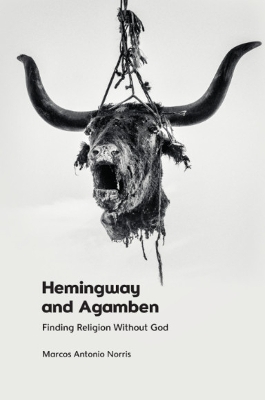
Hemingway and Agamben
Finding Religion without God
Seiten
2023
Edinburgh University Press (Verlag)
978-1-3995-1678-5 (ISBN)
Edinburgh University Press (Verlag)
978-1-3995-1678-5 (ISBN)
Interprets Hemingway's fiction through the philosophical lens of Giorgio Agamben
Resolves debate over Hemingway's religious orientation
Brings Hemingway, Jean-Paul Sartre, and Giorgio Agamben into close conversation for an interdisciplinary study of political theology, existentialism, posthumanism, and modernist literature
Leverages Giorgio Agamben's analysis of secularization for an unprecedented reading of Hemingway's fiction
Reveals the Roman Catholic foundations of secular existentialism, as well as the existential underbelly of literary modernism
Presents the ritualistic killing of animals by human beings as the latter's semi-conscious attempt to reclaim the imago Dei
Builds upon the preceding points to level a posthumanist critique of moral absolutism
Marcos Antonio Norris implements Giorgio Agamben's notion of 'secularized theism' to resolve a critical disagreement among Hemingway scholars who have portrayed the writer as either a Roman Catholic or a secular existentialist. He argues that Hemingway is, properly speaking, neither a secularist nor a theist, but a 'secularised theist', whose 'religion' is practiced through sovereign decision making, which, in its most extreme form, includes the act of killing. This book resolves an important debate in Hemingway studies and uncovers fundamental similarities between theism and atheism, building upon the theoretical undertaking first introduced by Agamben and the Existentialists (EUP, 2021). Bringing Ernest Hemingway, Jean-Paul Sartre and Giorgio Agamben into close conversation, the author reconceptualises existentialism, issues a posthumanist critique of moral authoritarianism and advances an original interpretation of Hemingway as a secularised theist.
Resolves debate over Hemingway's religious orientation
Brings Hemingway, Jean-Paul Sartre, and Giorgio Agamben into close conversation for an interdisciplinary study of political theology, existentialism, posthumanism, and modernist literature
Leverages Giorgio Agamben's analysis of secularization for an unprecedented reading of Hemingway's fiction
Reveals the Roman Catholic foundations of secular existentialism, as well as the existential underbelly of literary modernism
Presents the ritualistic killing of animals by human beings as the latter's semi-conscious attempt to reclaim the imago Dei
Builds upon the preceding points to level a posthumanist critique of moral absolutism
Marcos Antonio Norris implements Giorgio Agamben's notion of 'secularized theism' to resolve a critical disagreement among Hemingway scholars who have portrayed the writer as either a Roman Catholic or a secular existentialist. He argues that Hemingway is, properly speaking, neither a secularist nor a theist, but a 'secularised theist', whose 'religion' is practiced through sovereign decision making, which, in its most extreme form, includes the act of killing. This book resolves an important debate in Hemingway studies and uncovers fundamental similarities between theism and atheism, building upon the theoretical undertaking first introduced by Agamben and the Existentialists (EUP, 2021). Bringing Ernest Hemingway, Jean-Paul Sartre and Giorgio Agamben into close conversation, the author reconceptualises existentialism, issues a posthumanist critique of moral authoritarianism and advances an original interpretation of Hemingway as a secularised theist.
Dr. Marcos Antonio Norris teaches for the School of Writing, Literature and Film at Oregon State University. He is the co-editor of Agamben and the Existentialists (Edinburgh University Press, 2021) and the author of numerous peer-reviewed articles, most recently including Francis Macomber, the Matador: Reading Hemingway's 'The Short, Happy Life of Francis Macomber' with Death in the Afternoon in Studies in the American Short Story and Reading 'On the Quai at Smyrna' and 'A Natural History of the Dead' in Consideration of Hemingway's Anti-Humanism in The Hemingway Review. His research examines the intersections among existentialism, the continental philosophy of religion, and 20th century literature, cinema, and television.
| Erscheinungsdatum | 13.10.2023 |
|---|---|
| Verlagsort | Edinburgh |
| Sprache | englisch |
| Maße | 156 x 234 mm |
| Themenwelt | Geisteswissenschaften ► Philosophie ► Philosophie der Neuzeit |
| Geisteswissenschaften ► Religion / Theologie | |
| Geisteswissenschaften ► Sprach- / Literaturwissenschaft ► Anglistik / Amerikanistik | |
| Geisteswissenschaften ► Sprach- / Literaturwissenschaft ► Literaturgeschichte | |
| Geisteswissenschaften ► Sprach- / Literaturwissenschaft ► Literaturwissenschaft | |
| ISBN-10 | 1-3995-1678-7 / 1399516787 |
| ISBN-13 | 978-1-3995-1678-5 / 9781399516785 |
| Zustand | Neuware |
| Haben Sie eine Frage zum Produkt? |
Mehr entdecken
aus dem Bereich
aus dem Bereich


